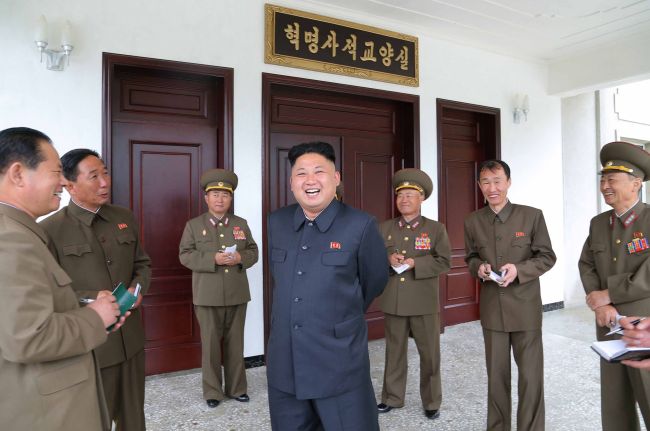Inter-Korean ties at crossroads amid mixed signals
Pyongyang issues threats alongside conciliatory gestures
By Shin Hyon-heePublished : May 28, 2014 - 21:00
After a year and a half since President Park Geun-hye took office, relations between the two Koreas appear to be hanging in midair as the North escalates military tension while sending conciliatory signals at the same time.
The communist state has in recent months threatened a fourth nuclear test, fired artillery shells toward southern waters, and churned out acerbic criticism against Seoul and Washington over their joint military drills and summit.
Yet Pyongyang last week said it would join this year’s Asian Games in the South Korean port city of Incheon. The announcement was chiefly in line with leader Kim Jong-un’s drive to promote sports among the public, but may also reflect his willingness to unfreeze ties with Seoul, experts say.
Such a dual-track approach is not new in the peninsula’s volatile 60-year history of division. But some officials and experts here see the coming few months as crucial in setting the stage for another chance to thaw relations ― or at least a conciliatory gesture ― given a likely flare-up in tension during the South Korea-U.S. Ulchi-Freedom Guardian exercise slated for August.
The communist state has in recent months threatened a fourth nuclear test, fired artillery shells toward southern waters, and churned out acerbic criticism against Seoul and Washington over their joint military drills and summit.
Yet Pyongyang last week said it would join this year’s Asian Games in the South Korean port city of Incheon. The announcement was chiefly in line with leader Kim Jong-un’s drive to promote sports among the public, but may also reflect his willingness to unfreeze ties with Seoul, experts say.
Such a dual-track approach is not new in the peninsula’s volatile 60-year history of division. But some officials and experts here see the coming few months as crucial in setting the stage for another chance to thaw relations ― or at least a conciliatory gesture ― given a likely flare-up in tension during the South Korea-U.S. Ulchi-Freedom Guardian exercise slated for August.

“If no nuclear test took place and the two sides managed to show signs of amity, we would see a much weaker backlash than usual from the North during the drill and look to the next step,” a Seoul official said on condition of anonymity due to the sensitivity of the issue.
Kim Yong-hyun, a North Korea studies professor at Dongguk University in Seoul, said Pyongyang’s decision on the Asiad may be a “signal that it wants dialogue” and “would help bring a turning point in the strained cross-border relationship.”
The atomic experiment remains the biggest factor in determining the future relations and the North Korea policy of Seoul, Washington and Beijing.
Should the North press ahead with the underground blast, it would drag the world back into a cycle of U.N. Security Council condemnation and sanctions which is likely to prompt further provocations by the unruly state.
For Seoul, that may spell trouble for Park’s foreign policy legacy.
On Monday, the foreign ministers of South Korea and China agreed to boost cooperation to block further North Korean nuclear tests and nurture conditions for “meaningful” dialogue on its denuclearization.
The six-party talks have been dormant since late 2008 as Seoul and Washington demanded steps to guarantee “sincere, substantive” progress on the denuclearization issue, whereas Pyongyang and China called for a swift, unconditional gathering.
Despite lingering differences, the latest ministerial talks and Chinese President Xi Jinping’s upcoming visit to Seoul could help build momentum to close the gap and pave the way for a fresh round of six-way talks.
“During past denuclearization talks, the North took advantage of them to beef up its nuclear capability and after the talks fell apart, we restarted them from a different starting point, with the North having an enhanced capability,” another Seoul official said on customary condition of anonymity after Monday’s meeting.
“If it is sincere about coming back to the negotiating table, there should be measures to preclude such an upgrade. … And I think China understood about the threshold.”
Other key points to watch are the imminent appointments of the new head of the National Intelligence Service and the National Security Office at Cheong Wa Dae.
Criticism had persisted that the Park administration’s North Korea policy has been dictated by three hard-line, former military commanders in the National Security Council ― NIS director Nam Jae-joon, NSO chief Kim Jang-soo and Defense Minister Kim Kwan-jin.
Though the NSO chief post is likely to be occupied by another military official, the forthcoming reshuffle may put fresh vigor into the rigid and lopsided NSC, with the controversial spy agency expected to be led by a close confident of Park yet with a more practical view such as Lee Byung-kee, a former NIS deputy director and the current ambassador to Japan.
By Shin Hyon-hee (heeshin@heraldcorp.com)









![[Hello India] Hyundai Motor vows to boost 'clean mobility' in India](http://res.heraldm.com/phpwas/restmb_idxmake.php?idx=644&simg=/content/image/2024/04/25/20240425050672_0.jpg&u=)









